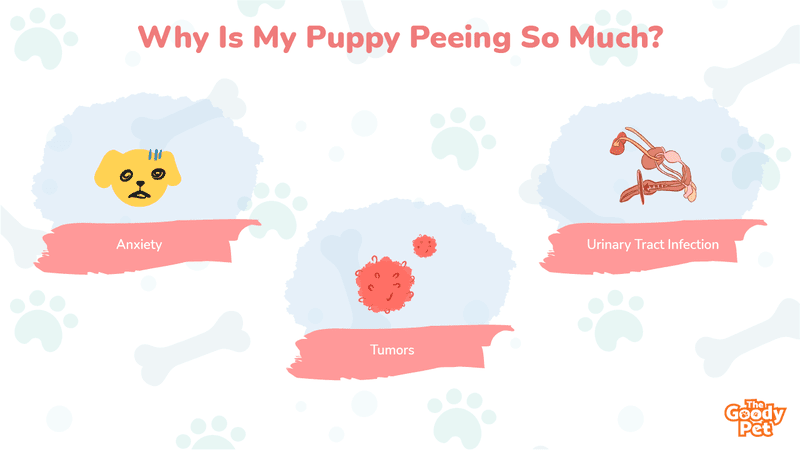I had heard about puppies peeing a lot but never took it seriously, until when I recently noticed my dear fido peeing so much.
So is it normal for puppies to pee a lot? Puppies will pee frequently because they can’t control their bowels and bladders. Their small bladder also means they have a smaller capacity to store their pee, hence they need to answer the call of nature pretty frequently. Therefore, you need to take your furry companion out after every hour, especially after meals.
This post will take a dig into why puppies pee a lot. Even more, I’ll uncover how to know if your pooch is suffering from UTIs. But before that, let’s look at some of the reasons why your canine buddy pees a lot.
Is It Normal For Puppy To Pee A Lot? Why Does My Puppy Pee So Much?
According to American Kennel Club, puppies go out every hour until they reach nine months old.
In other words, a four months old puppy will go out every five hours while a one-month-old puppy every one hour.
So why does my puppy pee so much? Below are some of the common reasons why your puppy is peeing so much.
Anxiety
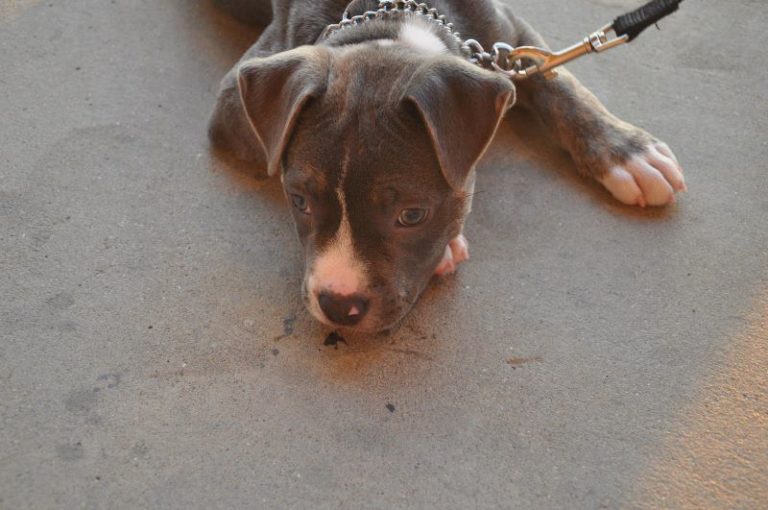
Puppies pee a lot when they experience fear or anxiety. Some puppies will bond so fast with their new owners, while some will not. Therefore, your pooch will experience separation anxiety if you don’t spend time with it. This makes it uneasy, resulting in frequent peeing.
Tumors
Brain tumors will also insert pressure between your puppy’s bladder and brain, which will hinder them from controlling their bladders. Sure, brain tumors are rare in puppies, but many senior dogs still suffer from Cushing’s Disease.
Tumors involve the growth of benign, which inserts the pressure on your puppy’s pituitary gland. When this happens, your pooch’s hormone shifts from normal, thus causing frequent peeing.
Urinary Tract Infection
Urinary tract infection is one of the most worrying reasons for your dear fido peeing so much. UTIs are more common in older female dogs than males or puppies. Puppies suffering from UTI will strain to urinate, whine or pass blood urine.
While this should worry you a lot, there’s no need to fret. The UTI is as a result of a bacteria present in your pooch’s urethra and can be rectified with antibiotics. However, there’s a need to consult your vet before giving your puppy any medication.
How Do I Know If My Puppy Has A Urinary Tract Infection (UTI)?

Like any other human being, urinary tract infections (UTI) are painful to puppies. And you’ll also agree that UTIs are uncomfortable and can impose severe dangers if proper medication isn’t observed.
These infections resolve with medication and do not cause any long-term damage.
On other occasions, your puppy’s UTI symptoms will result from conditions such as cancer or poisoning.
So ensure you’re well-knowledged about the symptoms and seek veterinary medical attention. Below are some of the notable UTI symptoms you should check out for:
Bloody Urine
Traces of blood in your puppy’s urine can be frightening. If you see blood in your puppy’s urine, please seek veterinarian medical attention for immediate treatment.
Difficulty In Urinating
Your dog’s inability to urinate can be fatal or rupture your puppy’s bladder if not treated. If you notice such symptoms, contact a veterinarian for help.
Bladder Cancer
Bladder cancer is a sign of UTI, which is a challenge to diagnose. Tumors will interfere with urine flow and cause bloody urine, which is why you need veterinary intervention.
Veterinarians usually resought for risk factors such as age and breed before treatment commences. Other notable tests such as ultrasounds and radiographs will be performed to check out for tumors, blockages, and other causes for your puppy’s current symptoms.
Urination Habit Changes
As a dog owner, you should understand your puppy’s everyday behaviors. If you notice any behavioral change in your puppy, seek the help of a veterinarian.
This is a sign of medical condition, and as such, act promptly. Frequent urination can signify diabetes, cancer, trauma, and urinary tract infections, among other conditions.
What Can You Give A Dog For Urinary Tract Infection (UTI)?
UTIs are common in dogs, but you don’t have to worry so much about them if treatment is initiated early enough.
Giving your pooch poor-quality dry food is one of its causes, and letting out alkaline urine, which facilitates bacteria growth.
So the first step to take if your pooch is suffering from UTI is to change its diet. Introduce your puppy either to a properly balanced raw food or any homemade diet. Below are some other measures you can take to eliminate UTIs from your furry friend.
Cranberry

Giving your puppy cranberry will help it in the case it is suffering from urinary tract infections.
Now, cranberry helps to prevent bacteria from aligning on the urinary tract. Even more, cranberry will help prevent future UTI infections.
Marshmallow Root
Marshmallow root will work great if your pooch has inflammation in its urinary tract.
Marshmallow root boosts your canine buddy’s immune system and suppresses the bacteria that cause UTIs.
Parsley Leaf
Apart from being nutritious, parsley leaves, and many other dietary plants, can also help eliminate urinary tract infections from your puppy according to studies.
Additionally, parsley leaves are diuretics, thus helping to eliminate waste.
Uva Ursi
Uva Ursi leaves are one of the powerful natural options you can use to get rid of UTIs. Most veterinarians use Uva Ursi to fight pathogens that cause urinary tract infections.
Best of all is that Uva Ursi leaves will reduce inflammation and stop bleeding, usually caused by UTIs.
Special Diets For Urinary Health
The Purina Pro Plan Veterinary Diets consist of special diets for better urinary health, which helps to deal with UTIs. We recommend Purina brand food because they help:
- To create an excellent urinary environment to minimize the development of calcium oxalate crystals.
- In dissolving sterile struvite stones.
How Do I Get My Puppy To Stop Peeing So Much?
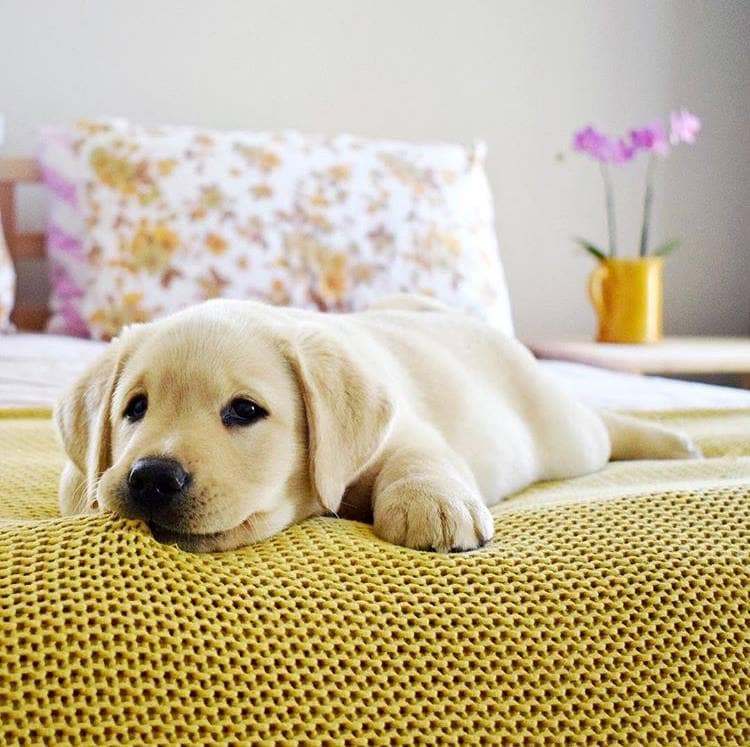
First and foremost, you don’t have to worry that your puppy is suffering from UTIs if you notice that it is peeing too much.
There are many other reasons why puppies pee so much.
Below are some of the remedies you can take to stop your dear fido from peeing a lot:
Wipe Out Odors
Puppies will decide on where to pee once they smell urine. Puppies like to use the place they had previously used to pee or poop.
To prevent them from peeing frequently, occasionally perform a thorough cleaning to eliminate any traces of urine or poop.
You can also use a high-quality odor-neutralizer to get rid of the smell when they pee on surfaces, like carpets.
Continue cleaning until there’s no residual odor even with your nose close to the ground. Because puppies have a strong sense of smell, make sure to clean the surface once more.
Potty Training
Potty training can be downright frustrating; even so, it will help a long way in your puppy’s behavior.
Have a schedule for you and your puppy, and each day should begin the same for both of you.
If you love taking walks in the morning, make sure to take your puppy along. While your puppy will pee once you return from the walk, consider extending the walk to enhance the tinkling urge, which prompts it to empty its bladder. This tactic will help a long way towards your puppy’s potty training.
Once you’ve identified your puppy’s potty area, make it a habit of using the same door.
Maintain distance while keeping an eye during the training so you can offer any help should your puppy find any difficulties.
What Age Should A Puppy Be Toilet Trained?
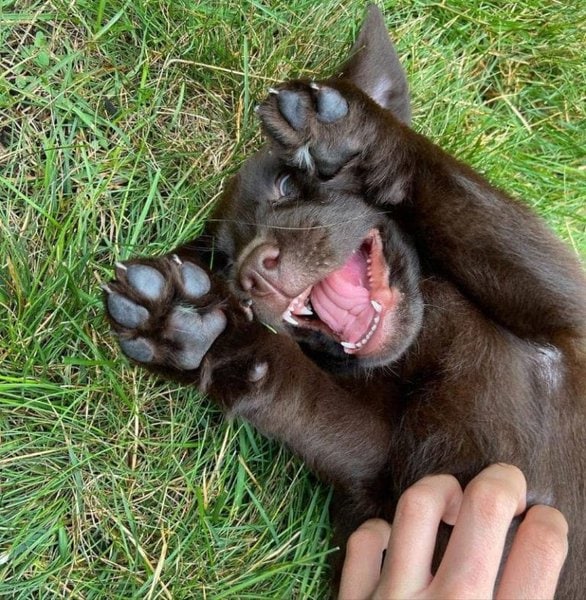
You can’t toilet train most puppies until they are at least 12 weeks old.
However, you can start taking your furry companion out every hour when it is six weeks old, though it won’t be ready for house training.
Experts and vets recommend that you start toilet training your pooch when 12 to 16 weeks old. At this time, puppies can hold their bowels and control their bladders.
The toilet training process will take a bit longer if you bring a puppy that just hit 12 weeks old. However, you can tweak your canine buddy’s behavior by encouraging and rewarding it for every progress.
Confine your pooch in a specific place, either in a crate, on a leash, or in a room. Gradually, your puppy will learn that it needs to go out and pee or poop.
When this is achieved, you can start giving your dear fido the freedom to roam in the house. Below are some steps to toilet train your puppy:
- Create a regular feeding routine for your canine and stick to it.
- Take your pooch out every 30-60 minutes and after meals.
- Take your furry companion to the same point so that it can get used to it.
- Always praise, encourage, reward, or treat your pooch when it pees or poops out.
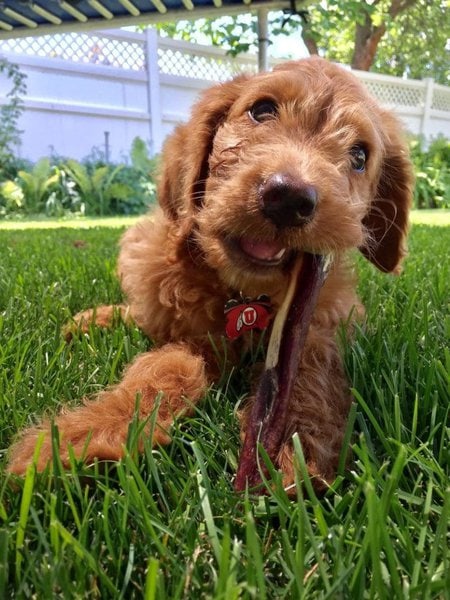
Related Questions
Why Is My Puppy Peeing So Much All Of A Sudden? Your puppy can pee a lot because of anxiety, urinary tract infections, tumors, diabetes, kidney infection, incomplete training, etc. Seek veterinary advice should you notice such conditions in your puppy. That said, older female dogs are more vulnerable than male dogs, regardless of their age.
Why Did My Dog Randomly Pee On My Bed? Your puppy is either anxious, nervous, or excited when he suddenly and randomly pees on your bed. Also, your puppy isn’t properly house-trained or loves your company. A puppy filled with emotions will also pee on your bed. And again, medical conditions such as UTI and diabetes will lead to increased rates of urination.
Why Is My Puppy Peeing A Lot After Vaccinations? Your pooch is peeing after vaccinations because different vaccinations come with different side effects, and peeing a lot is one of them. All the same, you should be wary of other reasons for peeing a lot in puppies.

